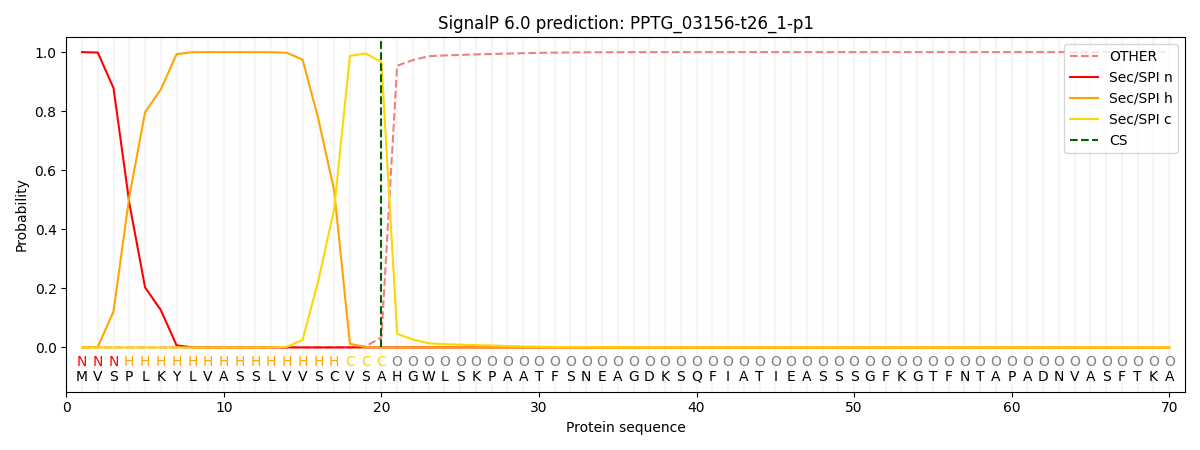You are browsing environment: FUNGIDB
CAZyme Information: PPTG_03156-t26_1-p1
You are here: Home > Sequence: PPTG_03156-t26_1-p1
Basic Information |
Genomic context |
Full Sequence |
Enzyme annotations |
CAZy signature domains |
CDD domains |
CAZyme hits |
PDB hits |
Swiss-Prot hits |
SignalP and Lipop annotations |
TMHMM annotations
Basic Information help
| Species | Phytophthora parasitica | |||||||||||
|---|---|---|---|---|---|---|---|---|---|---|---|---|
| Lineage | Oomycota; NA; ; Peronosporaceae; Phytophthora; Phytophthora parasitica | |||||||||||
| CAZyme ID | PPTG_03156-t26_1-p1 | |||||||||||
| CAZy Family | AA3 | |||||||||||
| CAZyme Description | hypothetical protein | |||||||||||
| CAZyme Property |
|
|||||||||||
| Genome Property |
|
|||||||||||
| Gene Location | ||||||||||||
CAZyme Signature Domains help
| Family | Start | End | Evalue | family coverage |
|---|---|---|---|---|
| AA17 | 13 | 261 | 5.4e-67 | 0.9183673469387755 |
CDD Domains download full data without filtering help
| Cdd ID | Domain | E-Value | qStart | qEnd | sStart | sEnd | Domain Description |
|---|---|---|---|---|---|---|---|
| 411053 | dermokine | 0.001 | 305 | 431 | 240 | 365 | dermokine. Dermokine, also known as epidermis-specific secreted protein SK30/SK89, is a skin-specific glycoprotein that may play a regulatory role in the crosstalk between barrier dysfunction and inflammation, and therefore play a role in inflammatory diseases such as psoriasis. Dermokine is one of the most highly expressed proteins in differentiating keratinocytes, found mainly in the spinous and granular layers of the epidermis, but also in the epithelia of the small intestine, macrophages of the lung, and endothelial cells of the lung. Mouse dermokine has been reported to be encoded by 22 exons, and its expression leads to alpha, beta, and gamma transcripts. |
| 411053 | dermokine | 0.003 | 312 | 433 | 212 | 337 | dermokine. Dermokine, also known as epidermis-specific secreted protein SK30/SK89, is a skin-specific glycoprotein that may play a regulatory role in the crosstalk between barrier dysfunction and inflammation, and therefore play a role in inflammatory diseases such as psoriasis. Dermokine is one of the most highly expressed proteins in differentiating keratinocytes, found mainly in the spinous and granular layers of the epidermis, but also in the epithelia of the small intestine, macrophages of the lung, and endothelial cells of the lung. Mouse dermokine has been reported to be encoded by 22 exons, and its expression leads to alpha, beta, and gamma transcripts. |
| 236090 | PRK07764 | 0.008 | 217 | 276 | 432 | 491 | DNA polymerase III subunits gamma and tau; Validated |
| 411418 | ser_rich_anae_1 | 0.009 | 324 | 442 | 288 | 399 | serine-rich protein. This serine-rich protein belongs to a family with large size (over 1000 amino acids), which a highly serine-rich central region that averages over 300 aa in length. Species encoding members of this family of proteins tend to be anaerobic bacteria, including Gram-positive bacteria of the human gut microbiome and Chloroflexi from marine sediments. |
| 411418 | ser_rich_anae_1 | 0.009 | 320 | 426 | 290 | 397 | serine-rich protein. This serine-rich protein belongs to a family with large size (over 1000 amino acids), which a highly serine-rich central region that averages over 300 aa in length. Species encoding members of this family of proteins tend to be anaerobic bacteria, including Gram-positive bacteria of the human gut microbiome and Chloroflexi from marine sediments. |
CAZyme Hits help
| Hit ID | E-Value | Query Start | Query End | Hit Start | Hit End |
|---|---|---|---|---|---|
| 9.20e-154 | 1 | 445 | 1 | 445 | |
| 4.00e-150 | 1 | 445 | 1 | 435 | |
| 3.43e-149 | 1 | 445 | 13 | 447 | |
| 4.87e-149 | 1 | 445 | 13 | 447 | |
| 1.31e-148 | 1 | 445 | 1 | 435 |
Swiss-Prot Hits help
SignalP and Lipop Annotations help
This protein is predicted as SP

| Other | SP_Sec_SPI | CS Position |
|---|---|---|
| 0.000521 | 0.999434 | CS pos: 20-21. Pr: 0.9661 |
